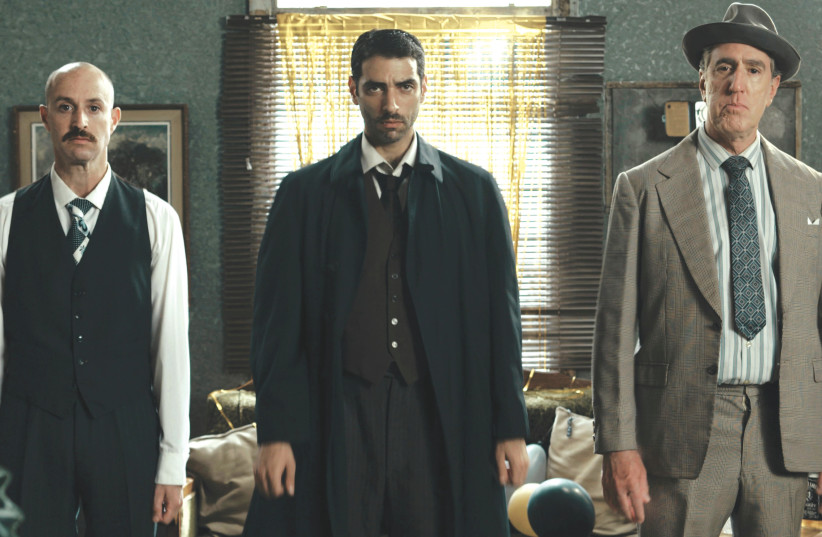Even though I had recently seen The City, the movie adaptation of Amit Ulman’s wildly inventive, neo-noir rap opera that just opened in Israel, I was worried that its writer/director/composer/star might blend in with all the hipsters at a Tel Aviv café where we were meeting. But Ulman arrived wearing a T-shirt with the word “Menashe” printed in large letters, and that made him stand out from all the latte drinkers.
Menashe is the name of the arch-villain in The City, and, if I had missed that reference, the back of the shirt bore the name and logo of the Incubator Theater, the theater collective created by Nissan Nativ Acting Studio graduates, where Ulman developed and first presented his play.
The City has been running for more than a decade and developed an enthusiastic, cult-like following. I gathered all this when I attended a sold-out screening of The City at the Jerusalem Cinematheque and overheard the excited audience discussing all the times that they had seen it on stage.
As the viewers repeated key lines and laughed in anticipation when certain characters made an appearance, the vibe was reminiscent of the original cult audience-participation movie, The Rocky Horror Picture Show, decades ago.
Asked about the shirt, Ulman, laughed and admitted that he just threw it on because he needed to do laundry and had a lot of these promotional T-shirts on hand. He’s been busy doing press for The City, which has gotten rave reviews.

The birth of The City: Israel's neo-noir rap opera
IT WAS TOO loud in the packed café to talk, so Ulman and I found a small, incongruously deserted park nearby that could have been the setting for a scene from the movie. He told me how he and his collaborators, Jimbo J, aka Omer Havron, and Omer Mor, created The City out of their work in their rap group, Victor Jackson, and how unexpectedly tough it was to bring it to the screen.
“It’s all one song really,” Ulman said. What’s amazing is that this rap song continues for the length of the movie, and tells a noir story of urban corruption and betrayal that is also fresh, funny, and filled with surprising plot turns, jokes, and contemporary references. It’s a song that works as a text in a way that most filmmakers can only dream of.
The story is told through the eyes of Joe, a not particularly successful detective, played by Ulman, who runs an agency with his partner, Jack (Omer Havron). When a mystery woman (Moria Akons) comes to see Joe, worried about the disappearance of her sister, Joe falls hard, and he and Jack investigate, as the corpses keep piling up all over town.
All signs point to Menashe, a master criminal who terrorizes the city, as being behind a series of murders. “I turned the musical energy into dramatic energy,” Ulman reflected.
He said he counts among his musical influences not only hip-hop and rap, but also Stephen Sondheim’s works, particularly the musicals A Little Night Music, Into the Woods, and Assassins. Asked about the noir side of the show, he said, “The Maltese Falcon was the biggest inspiration and Joe is kind of based on the character of Sam Spade,” taken from the Dashiell Hammett novel, who is portrayed so memorably by Humphrey Bogart in the movie.
“I wanted to investigate it dramatically. Of course, it’s a classic, but I wanted to figure out why it’s a classic. This story of a broken man, the detective, and a damsel in distress, seems to speak to all times.”
The “dry humor” in the noir genre also helped him find the tone for the piece. “He goes into it with eyes wide open, and he says that he knows, ‘No good will come of this.’” Using the noir tropes, he told a story that is “compressed and dense,” with lots of twists and fun in its 73-minute running time.
When he was writing the piece, Ulman said, “I wanted the audience to be surprised, but also to feel that they know what’s coming.”
IN SPITE of the success of the show, it wasn’t easy getting the movie financed. The film funds initially turned him down. “They said, ‘What succeeds on stage doesn’t transfer to the screen,’” he recalled.
That a film version would have a built-in audience in the theatergoers who had been enjoying it onstage for years did not impress the film-fund gatekeepers. Ulman initially found financing through a crowdfunding campaign on the Headstart platform, and eventually, the Kolnoa Mehadarom Fund came onboard.
Ulman, determined, started the shoot without full funding, trusting that the rest would come. Finally, the Israel Film Fund and a number of other funds and organizations followed.
The son of two chemists who were teachers, Ulman said his parents were at first a bit skeptical of his decision to go into acting, but have seen the show and are very supportive. Although he has moved into acting and entertainment rather than teaching and academia, he has an intellectual take on his material and his braininess comes through in every moment of The City.
Some may see it as timely that this story of a corrupt city is coming out as protesters regularly take to the streets and top officials are on trial for corruption.
“It doesn’t have a specific political message, it’s a general human message... It bothers me how language and the media have become debased,” he said.
“I’m sensitive to language,” said Ulman modestly as he tried to explain the wealth of puns, jokes, and references to Israeli life. There is an English-language stage version as well, which was performed about six years ago, but the movie is all in Hebrew. “We need to fight for our language.”
